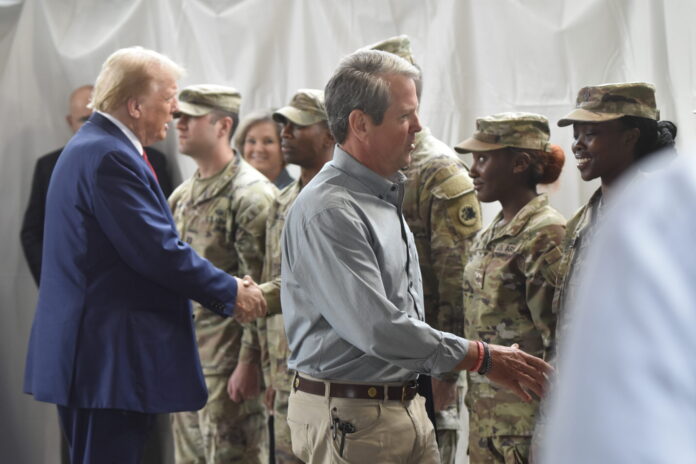
(Georgia Recorder) — Georgia Gov. Brian Kemp is sending approximately 75 members of Georgia’s National Guard to assist U.S. Immigration and Customs Enforcement with immigration enforcement efforts, his office announced Monday. The Peach State is joining 18 other states to mobilize a collective 1,700 troops nationwide.
Guard members will not be tasked with making immigration arrests, but instead will assist with “administrative and logistic support,” according to the governor’s office. Processing and training are scheduled to begin in mid-September.
“I am proud to stand with President Trump’s team in the ongoing efforts to secure our nation’s border and keep Americans safe,” Kemp said in a statement. “With the longest continuous presence at the border of any National Guard, Georgia has led on this front for years and will continue to do so through this latest measure while still meeting all responsibilities and duties the Guard has to the state.”
SEE ALSO Trump creates ‘quick reaction’ force out of state Guard troops for law enforcement
Troop deployment questioned
State officials stressed that partnerships between the National Guard and other governmental entities are not new. In February of 2024, Kemp authorized members of Georgia’s National Guard to assist with Texas’ border operations.

They also said that the move to have guard members assist with immigration enforcement “is different and separate from” Trump’s recent takeover of the District of Columbia.
State Rep. Eric Bell, a Jonesboro Democrat who served in the U.S. Navy, condemned the use of the Georgia National Guard to assist with immigration enforcement.
“I believe Georgia is standing at a crossroads regarding governance and the protection of individual rights,” he said in a statement. “What is before us is not from foreign shores but from within—the possibility of deploying troops on our own soil, against our own citizens. This is no act of security. I believe this an attempt to create division among Americans and Georgians and could be seen as serving private interests rather than the public.”






